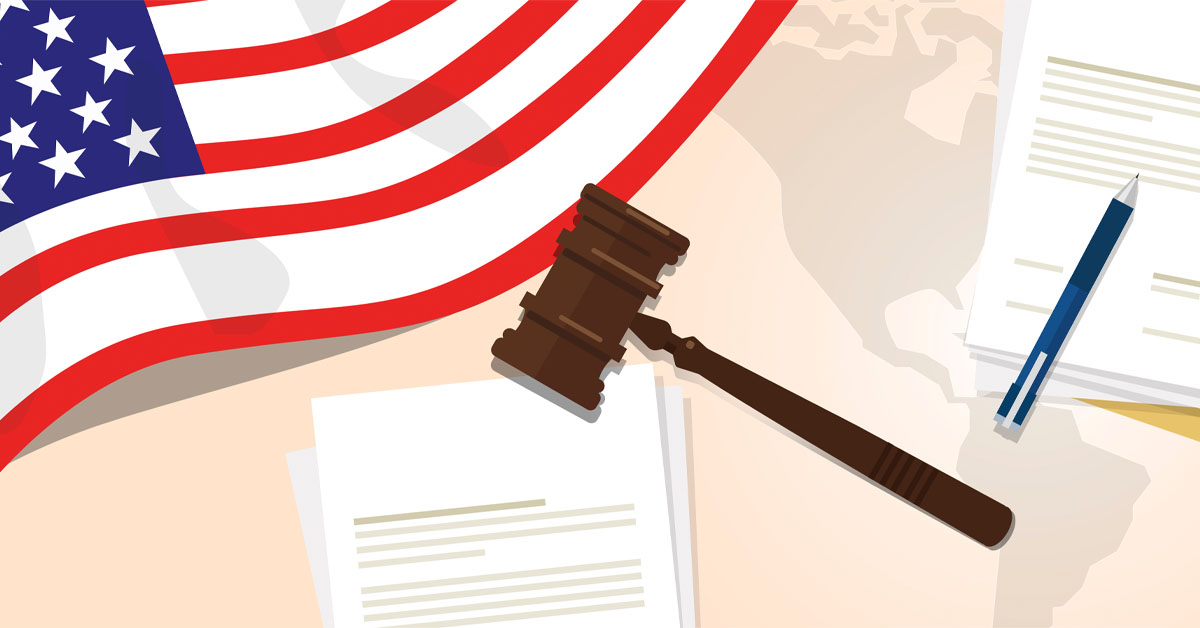H-1B Visa Status: Changes to Prevailing Wage Sparks Lawsuits

Post Categories
Emilie
The Department of Labor recently changed the prevailing wages for H-1B employees, effective October 8th, 2020. The new rule is facing public scrutiny and has immediately found itself immersed in lawsuits.
What is the H1B prevailing wage law?
The Department of Labor H-1B program allows US companies to seek employees from outside the US for specialty occupations. Employers may temporarily hire nonimmigrant aliens where they might otherwise not be eligible for employment in the US. The law expands businesses’ access to qualified individuals for specialty roles when those skills or expertise may be difficult to obtain in the US.
What is a Nonimmigrant alien?
According to the Bureau of Alcohol, Tobacco, Firearms, and Explosives (ATF), "nonimmigrant aliens" are generally “tourists, students, business travelers and temporary workers who enter the U.S. for fixed periods of time; they are lawfully admitted aliens who are not lawful permanent residents.”
What is a specialty occupation?
A specialty occupation is one that requires at a minimum, a bachelor’s degree. It is an occupation dependent upon a specialized and abundant accumulation of knowledge in a specific realm.
What is the H1-B prevailing wage law?
The H-1B law maintains a standard of wages based on average wages for equivalent positions when experience and qualification levels are similar. It is meant to protect both immigrant workers from wage suppression and US employees from job scarcity due to lower-paid competition for similar work.
What is the wage adjustment?
There are four wage levels for those with H-1B visa status. The new law raises pay for H-1B workers by about 30% for each wage level. This could be increases of $30,000 - $40,000 annually per impacted worker; a startling amount for some employers that were blindsided by the new wage increases and depend on H-1B visa holders for their business.
When does it take place?
The new law was made public on October 8th, 2020 and was effective immediately. Urgently passing a law, without public notification and commentary, goes against the rule making procedures of the Administrative Procedure Act. The plaintiffs challenging the rule’s legality claim the Administrative Procedure Act was violated because of this. While the defendants justify the urgency, citing unemployment issues, it is argued that the “good cause” is unfounded, and economic data behind unemployment does not support this new rule.
Who will be affected?
- Employers of many H-1B visa holders: These increases were sudden, not granting time for organizations to adjust budgets. It will be significantly impactful for those organizations that have several H-1B employees and depend on them for the nature of their business. These businesses will have to either find the wage increases in their budget or face a shortage of employees with critical specialized knowledge.
- Workers with H-1B visa status: Those employees that are fortunate enough to have employers that can take on the wage increases may enjoy a significant pay raise. However, those that aren’t could lose their jobs, face shortages of work, and worse, lose their visa that allows them to remain in the states. This means lost jobs and moving from their established homes.
- Foreign college students: Many foreign college students look for employment after they graduate to stay in the US. Employers may be reluctant to pay under-experienced graduates the same rates as their American superiors, who are more qualified, with higher education or more experience. After graduation, these foreign students lose their education visas, and without work, will have to leave the US.
- American universities: Without the hope of employment afterward, international students will be discouraged from coming to the US to study. Foreign minds will be driven to other parts of the world, and American institutions will suffer from reduced intellect, diversity, and student body numbers.
- Small and medium businesses: Many US small and mid-sized businesses that employ H-1B visa holders will be deeply impacted by the new wage requirements. At rates that may be close to double what they are paying currently, businesses will have to let employees go to make room in the budget and suffer being understaffed and less agile.
- American citizens: Americans that work in support roles for organizations that depend on high-skilled foreigners may find that budget cuts jeopardize their employment. They may be laid off so their salaries can be recovered and put toward H-1B visa holders that provide the skills that define the nature of the business (for instance, IT or engineering). This effectively would cause what the law intended to prevent. However, it is a reasonable possibility.
- The American economy: Research shows that H-1B status employees improve the American economy. By reducing specialized skills and knowledge in the US through the new wage rule, talent is sent elsewhere. This dilutes talent in the US, increases it abroad, and makes America less competitive on the world stage.
What is the H-1B lawsuit about?
The US Department of Labor is facing multiple lawsuits from individuals and organizations regarding the new H-1B prevailing wage rules. Most are claiming that the rule did not comply with standard procedures and is irrationally based, without proper data justification, and conflicts with economic theory.
ItServe is the United States’ largest association representing IT, consulting, and staffing organizations. It has filed a lawsuit against the Department of Labor to challenge the recent changes to the H-1B law. The lawsuit disputes the Department of Labor’s decision to dramatically increase wages for nonimmigrant aliens, without having followed the proper practices of the Administrative Procedure Act. It also suggests that the rate increase was founded on outdated data, when newer, more accurate data was available. The lawsuit claims it conflicts with basic economic principles, and the rates were arbitrarily set. It also challenges the rate, making a claim that it violates the Immigration and Nationality Act.
Breaking down the claims of the H-1B prevailing wage lawsuit
The Administrative Procedure Act
The Administrative Procedure Act (APA) defines the process by which federal laws and regulations are issued. Its purpose is to ensure that federal agencies keep the public informed. By requiring that proposed and final rulemaking be publicized on the Federal Register, the public is notified and can be involved in the process. It standardizes the rule-making process and provides an avenue for public and judicial review.
The new H-1B rule not only violates the 30-day required delay before a law goes into effect but the standardized process for rule making set forth by the APA was not followed. This particular new rule also did not take advantage of the laws set forth in the 1990’s that allows agencies to meet directly with interested parties to collaborate on lawmaking.
Furthermore, US unemployment rates were used as justification for emergency measures restricting employment of skilled foreigners. However, occupations most filled by H-1B visa holders have not experienced significant changes in employment rates, even as unemployment rates nationwide have grown. Therefore the ‘good cause’ to surpass the APA is also absent, plaintiffs claim.
Claims of Arbitrary Wage Setting
The H-1B prevailing wage law has always been based on average wages paid to similarly qualified individuals holding equal positions. The lawsuit cites research conducted by the National Foundation for American Policy, claiming that entry level rates are now based on median rates that would be attainable via more experience or academic achievement. For instance, new prevailing wage laws set the entry level rate at the rate paid to those with master’s degrees in a field where bachelor’s degrees are the entry level requirement. Employers will be required to pay more for foreign workers with less knowledge and experience.
Conflicts with Basic Economics
National Foundation for American Policy claims that research shows foreign workers do not harm American labor markets. US workers are not adversely affected by H-1B visa holders, and in fact, H-1B workers actually create jobs. Policy makers should consider that further restrictions to finding foreign experts could cause job loss in the United States, as corporations look to headquarter offshore to meet their human resource needs.
Rate Challenges
There are four rate levels in the Department of Labor (DOL) wage system that determine minimum salary. Under the new law, each level has increased by over 30% on average.
- Level 1: +39%
- Level 2: +41%
- Level 3: +43%
- Level 4: +45%
The substantial increase across all wage levels is irrational, according to those that oppose the rate raise. To set the minimum wage requirements, DOL uses Occupational Employment Statistics data to create a level for each occupation. The claim is that by inflating the minimum rate for foreign employees, brand new employees may be starting out at the midway point of other employees with more years of experience and education.
In some instances, salaries increased by over 100%. The analysis concludes by saying that it is evident that the prevailing wage rule is meant to price high-skilled immigrants out of the US labor force. There is no justification from any economic data that provides these numbers as median wages.
Violation of the Immigration and Nationality Act
Plaintiffs also claim that the Immigration and Nationality Act has been violated. The Immigration and Nationality Act governs how wages are set for those with H-1B visa status. However, this process was not used to set the new wages.
The Future of the H-1B New Rule
More lawsuits are being filed against DOL, with plaintiffs ranging from universities, to research centers, health care facilities, and individuals. Because of the new rule, over 30% of the 580,000 foreign employees in the US will not be able to renew their visas. This means job loss, and a separation from the home they’ve built with their families in America.
Timpl is a staffing agency that specializes in the Accounting & Finance, Healthcare, Manufacturing, and Information Technology industries. If your organization is impacted by this new rule and is looking for staffing solutions, please contact us.


